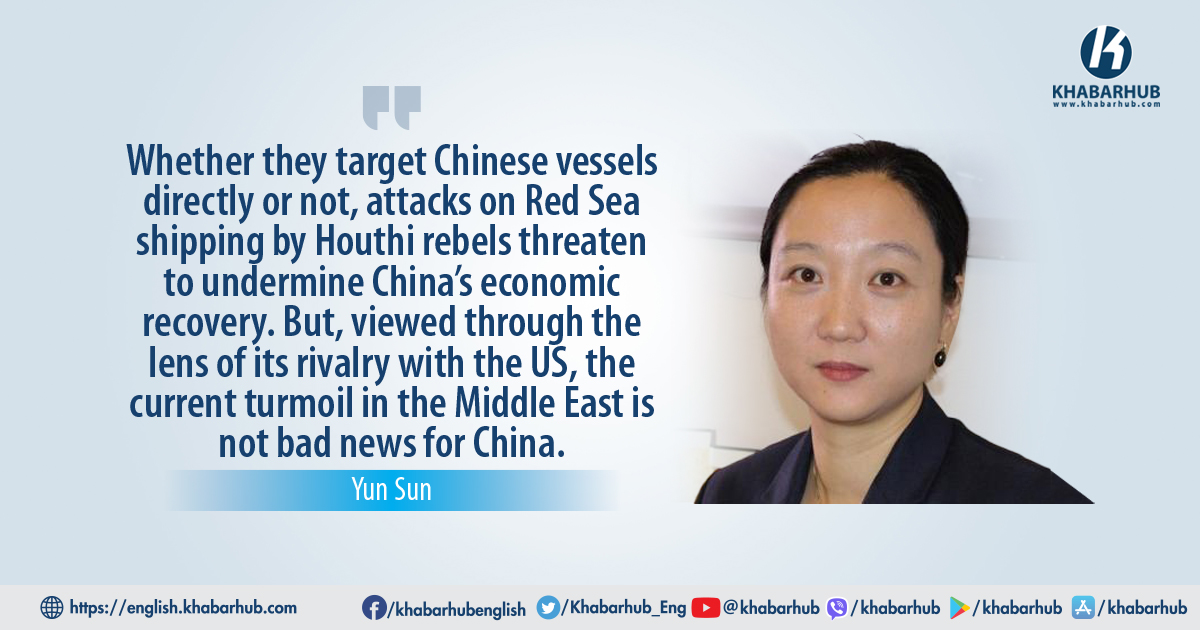Chinese policy in the Middle East is shaped by two factors: China’s threat perceptions and its strategic calculus regarding its great-power competition with the United States.
And when it comes to dealing with the US, China’s approach comes down to three “nos”: no cooperation, no support, and no confrontation.
This credo underlies China’s decision not to push back against the Iran-backed Houthis as they carry out drone and missile attacks on Red Sea shipping lanes.
The Red Sea attacks – a response to Israel’s war against Hamas in Gaza – have not directly threatened Chinese ships, and the Houthis insist this will not change: neither Chinese or Russian vessels will be targeted, a senior Houthi official declared last month, as long as they are not connected with Israel.
But the attacks will still affect China’s economic interests, and not only because of the need to avoid links with Israel.
(COSCO, China’s largest shipping conglomerate, has already been forced to suspend all shipping to Israel, owing to security concerns.)
And China is unlikely to go much further. Since Chinese strategists tend to view developments in the Middle East through the lens of Sino-American relations, even regional instability might not appear all bad to China.
The identification of ships (or their flag countries) is not always straightforward, and shipping that affects China’s interests can still be targeted. But avoiding the area is costly.
The Red Sea is one of the most sensitive chokepoints for world trade.
If Chinese ships heading to Europe must circle around the Cape of Good Hope, rather than following the traditional route through the Suez Canal, a 26-day journey grows to 36 days and adds significantly to costs.
Longer shipping routes could also raise import prices, potentially fueling inflation in China; if oil prices are affected, China’s economy – already in the doldrums – will come under even more pressure.
More broadly, continued shipping disruptions will hamper China’s efforts to boost its economy by strengthening external trade.
So, whether they target Chinese vessels directly or not, Houthi attacks on Red Sea shipping could undermine China’s economic recovery.
And things could get much worse: if Iran deepens its involvement in the conflict between the Houthis and the US-led coalition that is launching strikes against them, the Strait of Hormuz could be affected, threatening China’s energy supplies.
Under no circumstances will China join the US-led coalition against the Houthis, not only because of the first “no,” but also because this would upend its own delicate balancing act between Israel and the Arab world, and between Sunni and Shia Muslims.
Yet, for now, China does not seem to be treating the threat posed by the Houthis as either immediate or acute.
Yes, Chinese officials have reportedly urged their Iranian counterparts to pressure the Houthis to curb their attacks.
But, while China has some influence over Iran, it hardly controls Iranian policy.
Nor is Iran fully in control of the Houthis, despite being their main backer. Given this – and contrary to what the US apparently thinks – China’s ability to rein in the Houthis diplomatically is limited.
And China is unlikely to go much further. Since Chinese strategists tend to view developments in the Middle East through the lens of Sino-American relations, even regional instability might not appear all bad to China.
Among Chinese experts, there is no shortage of schadenfreude watching the US being forced to back Israel, at the cost of its strategic relationships with Muslim countries in the region.
And China can only benefit from its great-power rival being sucked into a conflict in the Middle East, at a time when it is already heavily invested in the Ukraine war.
To be sure, China does not appear to be plotting to exploit America’s distractedness, say, by making a move on Taiwan.
But it does relish the decline of US credibility and leadership.
The longer the US stands by Israel, the more opportunity China will have to consolidate its ties with other Middle Eastern countries, and the more credible China’s alternative approach to regional security will appear.
China well knows that reaching a two-state solution is highly unlikely to happen anytime soon, not least because it would fundamentally change Israel’s national-security outlook and that of the entire Middle East.
Under no circumstances will China join the US-led coalition against the Houthis, not only because of the first “no,” but also because this would upend its own delicate balancing act between Israel and the Arab world, and between Sunni and Shia Muslims.
The fact remains, however, that the Houthis’ activities in the Red Sea are costing China. So, what are China’s options?
One possible response is to deploy naval escorts for cargo ships, as China has been doing in the Gulf of Aden since 2008.
But the Gulf of Aden escorts – part of a counter-piracy effort – are deployed on the basis of a mandate from the United Nations: Security Council Resolution 1846.
Without such a mandate, the Chinese have been reluctant to pursue similar actions in the Red Sea, though they have recently begun to do so.
But, for China, the easiest and most politically convenient response to the current Middle East crisis lies elsewhere.
The key is to blame the turmoil since Hamas’s October 7 attack on Israel – the event that triggered the current conflict – on the failure of the US and Israel to achieve a two-state solution with the Palestinians and to treat such a deal as the precondition for any practical resolution to the ongoing crisis.
China well knows that reaching a two-state solution is highly unlikely to happen anytime soon, not least because it would fundamentally change Israel’s national-security outlook and that of the entire Middle East.
But achieving a two-state solution is probably not the point; undermining the US is.
(Yun Sun is a senior fellow and Co-Director of the East Asia Program and Director of the China Program at the Stimson Center)
Copyright: Project Syndicate









Comment